|
|
|
Sort Order |
|
|
|
Items / Page
|
|
|
|
|
|
|
| Srl | Item |
| 1 |
ID:
087446
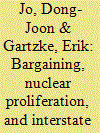

|
|
|
|
|
| Publication |
2009.
|
| Summary/Abstract |
Contrasting claims about the consequences of nuclear weapons rely on different interpretations about how leaders respond to risk, uncertainty, and the balance of power. Nuclear optimists use deterrence theory to argue that proliferation can promote stability and inhibit the use of force. Pessimists argue that proliferation precipitates nuclear hubris, accident, or anger that heightens the risk of war. It is also possible that nuclear weapons have no net effect on dispute propensity. Since states fashion their own bargains, nuclear status is bound to influence the distribution of influence. Proliferation also reflects existing tensions, biasing upward the apparent impact of nuclear weapons on conventional conflict. Instrumenting for the decision to proliferate, the authors find that nuclear weapons increase diplomatic status without much affecting whether states fight.
|
|
|
|
|
|
|
|
|
|
|
|
|
|
|
|
| 2 |
ID:
080979
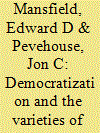

|
|
|
|
|
| Publication |
2008.
|
| Summary/Abstract |
Scholars of international relations have devoted remarkably little attention to the issue of why and when states enter international organizations (IOs). We argue that states have particular reason to enter IOs during the process of democratization. In the midst of a democratic transition, state leaders have difficulty making a credible commitment to sustain reforms, since they can benefit from rolling back liberalization. Gaining membership in an IO can enhance the credibility of leaders' commitments to democratic reforms. However, not all IOs are equally useful in this regard. We distinguish between IOs that cover standards in areas such as human rights and environmental protection, those that regulate economic activity, and those that are forums for addressing broad political problems. We argue that democratizing states have greater reason to join standards-based and economic IOs than political organizations. The results of a set of statistical tests support this argument
|
|
|
|
|
|
|
|
|
|
|
|
|
|
|
|
| 3 |
ID:
087448
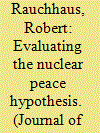

|
|
|
|
|
| Publication |
2009.
|
| Summary/Abstract |
Do nuclear weapons reduce the probability of war? This article quantitatively evaluates the nuclear peace hypothesis. The results indicate that the impact of nuclear weapons is more complicated than is conventionally appreciated. Both proliferation optimists and pessimists find confirmation of some of their key claims. When a nuclear asymmetry exists between two states, there is a greater chance of militarized disputes and war. In contrast, when there is symmetry and both states possess nuclear weapons, then the odds of war precipitously drop. When combined, these findings provide support for the existence of the stability-instability paradox. Evidence suggests that while nuclear weapons promote strategic stability, they simultaneously allow for more risk-taking in lower intensity disputes.
|
|
|
|
|
|
|
|
|
|
|
|
|
|
|
|
| 4 |
ID:
087444
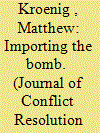

|
|
|
|
|
| Publication |
2009.
|
| Summary/Abstract |
Why do nuclear weapons spread? Using new data on sensitive nuclear transfers, this article analyzes the determinants of nuclear proliferation. The author first describes a simple logic of the technical and strategic advantages that potential nuclear proliferators can gain by importing nuclear materials and technology from more advanced nuclear states. The author then shows that sensitive nuclear transfers are an important determinant of nuclear proliferation. In broader terms, the author find strong support for a supply-side approach to nuclear proliferation. States that are better able to produce nuclear weapons, due to either international assistance or domestic capacity, are more likely to do so.
|
|
|
|
|
|
|
|
|
|
|
|
|
|
|
|
| 5 |
ID:
080976
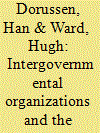

|
|
|
|
|
| Publication |
2008.
|
| Summary/Abstract |
The authors use network analysis to argue that the main contribution of intergovernmental organizations (IGOs) to international stability is not necessarily their direct and individual impact, because generally IGOs are institutionally weak. Rather, membership of IGOs creates network ties between states, allowing them, either individually or collectively, to intervene more effectively in latent conflicts. The IGO network also provides direct and indirect communication channels, where indirect links can act as partial substitutes for direct diplomatic ties. Empirically, the authors apply these ideas to the extensive network of international linkages created in the post-World War II period. They demonstrate that indirect links do indeed matter and that they substitute for more direct diplomatic ties. Furthermore, these effects are not limited to ties created by IGOs with specific security functions
|
|
|
|
|
|
|
|
|
|
|
|
|
|
|
|
| 6 |
ID:
080978
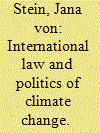

|
|
|
|
|
| Publication |
2008.
|
| Summary/Abstract |
A considerable challenge for the creators of international environmental agreements is how to design mechanisms that deter defection without deterring participation. Relatively ``soft'' law often garners widespread participation, but it creates few concrete incentives for states to improve behavior. ``Harder'' commitments make shirking more difficult, but these institutional features may deter from joining the very states whose practices are least consistent with the treaty's requirements. Empirical analyses of ratification of the core agreements of the climate change regime support these propositions. Flexibility provisions provide one mechanism for states to mitigate this dilemma. The findings with regard to one flexibility mechanism strongly support this argument. The results with regard to a second flexibility mechanism, however, tend to follow an opposite pattern. The author offers a preliminary interpretation of this finding. Finally, this article provides insight into how international social networks and the strength of domestic nongovernmental organizations affect ratification
|
|
|
|
|
|
|
|
|
|
|
|
|
|
|
|
| 7 |
ID:
080975
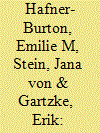

|
|
|
|
|
| Publication |
2008.
|
| Summary/Abstract |
This special issue seeks to move forward the development of an empirical research agenda that takes seriously the complexity of how international organizations (IOs) function and the need to study that complexity at all levels of analysis by using robust research tools. We advocate for a broad empirical research approach that molds and sharpens theories about IOs by conducting systematic tests in large-sample environments. Two themes create a common thread throughout this issue. First, shifting the focus from whether IOs matter to how they work requires acknowledgment of the contingency of cause and effect. A second common thread lies in the authors' treatment of IO membership as an aggregate phenomenon-that is, as a set of institutions and relationships evolving over time and with many members rather than as a single organization.
|
|
|
|
|
|
|
|
|
|
|
|
|
|
|
|
| 8 |
ID:
080980


|
|
|
|
|
| Publication |
2008.
|
| Summary/Abstract |
Regional and global intergovernmental organizations have grown both in number and scope, yet their role and effectiveness as conflict managers is not fully understood. Previous research efforts tend to categorize organizations solely by the scope of their membership, which obscures important sources of variation in institutional design at both the regional and global levels. International organizations will be more successful conflict managers if they are highly institutionalized, if they have members with homogeneous preferences, and if they have more established democratic members. These hypotheses are evaluated with data on territorial (1816-2001), maritime (1900-2001), and river (1900-2001) claims from the Issue Correlates of War (ICOW) project in the Western Hemisphere, Europe, and the Middle East. Empirical analysis suggests that international organizations are more likely to help disputing parties reach an agreement if they have more democratic members, if they are highly institutionalized, and when they use binding management techniques
|
|
|
|
|
|
|
|
|
|
|
|
|
|
|
|
| 9 |
ID:
087450
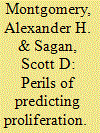

|
|
|
|
|
| Publication |
2009.
|
| Summary/Abstract |
Studies of nuclear proliferation share five serious problems. First, nuclear programs' initiation and completion dates are ambiguous and difficult to code, but findings are rarely subjected to sufficient robustness tests using alternative codings. Second, independent variables overlook important factors such as prestige and bureaucratic power and often use poor proxies for concepts such as the nonproliferation regime. Third, methodologies and data sets should be tightly coupled to empirical questions but are instead often chosen for convenience. Fourth, some findings provide insights already known or believed to be true. Fifth, findings can ignore or gloss over data crucial for policy making and wider debates. This article reviews new quantitative research on nuclear proliferation, noting improved analysis and lingering problems. It highlights the 1999 Kargil war to explore dangers of relying on stock data sets and the need for research on statistical outliers. It concludes with a future research agenda aimed at correcting problems and a cautionary note regarding hasty application of quantitative results to policy making.
|
|
|
|
|
|
|
|
|
|
|
|
|
|
|
|
| 10 |
ID:
080977


|
|
|
|
|
| Publication |
2008.
|
| Summary/Abstract |
Does the dramatic rise of the number of preferential trade agreements (PTAs) worldwide make economic sanctions more likely through increasing the leverage of the powerful and pitting states against each other in competition (power) or less likely through increasing the benefits of trade, resolving disputes, and promoting like-minded communities (plenty)? The authors offer the first systematic test of these propositions, testing hypotheses on sanctions onset using a data set of episodes from 1947 through 2000. In favor of the plenty argument, increases in bilateral trade do decrease sanctioning behavior; in favor of the power argument, an increase in the potential sanctioner's GDP or centrality in the network of all PTAs make sanctioning much more likely. However, mutual membership in PTAs has no direct effect on the propensity of states to sanction each other
|
|
|
|
|
|
|
|
|
|
|
|
|
|
|
|
| 11 |
ID:
087447
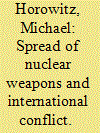

|
|
|
|
|
| Publication |
2009.
|
| Summary/Abstract |
This article evaluates whether the length of time states have nuclear weapons influences their behavior and the behavior of opponents in militarized disputes. Using multiple statistical models and illustrative cases, the article shows that, while acquiring nuclear weapons makes states significantly more likely to reciprocate militarized challenges and have their challenges reciprocated, over time, the effect reverses. In contrast to a static understanding of nuclear weapons, this variation in outcomes over time highlights the difficulties presented by nuclear proliferation.
|
|
|
|
|
|
|
|
|
|
|
|
|
|
|
|
| 12 |
ID:
087445


|
|
|
|
|
| Publication |
2009.
|
| Summary/Abstract |
When and why do states transfer nuclear technology, materials, and knowledge to other states for peaceful purposes? This question is important given the recent finding that countries receiving nuclear aid are more likely to pursue and acquire nuclear weapons. I argue that countries provide civil nuclear assistance for three strategic reasons: to strengthen their allies and alliances, to strengthen their relationship with enemies of enemies, and to strengthen existing democracies and bilateral relationships with these countries (if the supplier is also a democracy). I test these arguments using statistical analysis and a new data set on more than 2,000 bilateral civilian nuclear cooperation agreements signed between 1950 and 2000. The findings offer robust empirical support for my argument and very little support for the competing explanation rooted in norms and nonproliferation. This article enhances scholarly understanding of how and why nuclear weapons spread and encourages further research on the supply side of nuclear proliferation. It also has broad implications for the literatures on norms and international cooperation.
|
|
|
|
|
|
|
|
|
|
|
|
|
|
|
|
| 13 |
ID:
087449
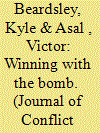

|
|
|
|
|
| Publication |
2009.
|
| Summary/Abstract |
Nuclear weapons' effects on an actor's success in coercive diplomacy are in part a function of how nuclear weapons change the perceived costs of conflict. The authors argue that states can improve their allotment of a good or convince an opponent to back down and have shorter crises if their opponents have greater expected costs of crisis. Noting that nuclear weapons increase the costs of full-escalation scenarios but decrease their probability, it is uncertain what impact nuclear weapons should have on expected costs of conflict. The authors assess crisis outcomes from 1945 to 2000 using the International Crisis Behavior data set. The evidence confirms that nuclear actors are more likely to prevail when facing a nonnuclear state. The expected duration of crisis in such asymmetric directed dyads is substantially smaller than the duration of crisis for actors in nonnuclear dyads. Nuclear actors in asymmetric dyads are also more likely to prevail than states in symmetric nuclear dyads.
|
|
|
|
|
|
|
|
|
|
|
|
|
|
|
|
|
|
|
|
|